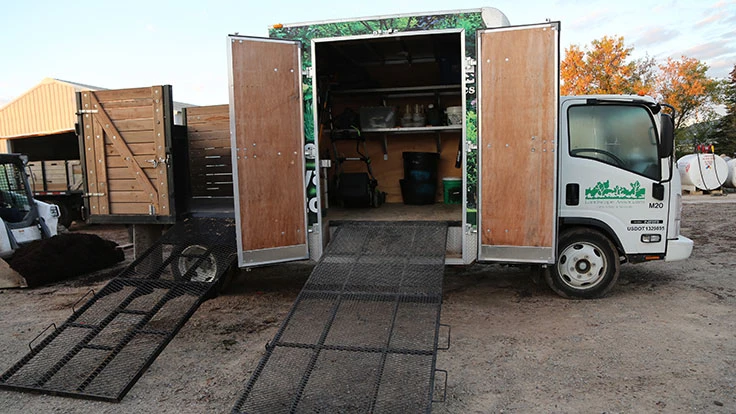
Everyone has different needs for their trailers based on the amount and types of equipment they have, but all contractors can figure out where to start by looking to other businesses for inspiration.
Gerry Andrews, president of Landscape Associates in De Pere, Wisconsin, had a lot of ideas for his own trailer setups from ones he’d seen at trade shows or at other companies. For instance, Landscape Associates has two trucks in its fleet for technical maintenance crews. The back half of these trucks can dump and the front half is a trailer with a large walk-in box with a ramp. These trucks have been ideal for work at residential sites or other sites that don’t need big mowers.
Andrews’ team customized many configurations used in his trucks. Also, every winter, Andrews’ team evaluates their storage configurations and tweaks it to increase efficiencies, he says.
“We had to go back and retrofit our enclosed trailers with heavier plywood to attach stuff to the walls securely. That was probably one of our bigger challenges. Those trailers bounce around, so we had to find ways to modify hardware to hold the equipment securely and keep it where we want it to be,” Andrews says.
Smail Landscape Contracting in Roaring Spring, Pennsylvania, built its own custom wooden shelves for their trucks. They used those to store their tools on the box trailer walls. Their storage system continually evolves based on trial and error. In addition, the Pennsylvania company has two open trailers for mowing crews and two enclosed trailers that can be locked and stored at the job site on multi-day projects.
“When we first got the box trailers, I had gotten them for mowers because I thought it would be like a garage on wheels,” says Byron Smail, owner of Smail Landscape Contracting. “That worked really well until we realized we could be more efficient with the open trailers.”
Andrews’ mowing crews also use open trailers for mower storage and transport. However, with open trailers, contractors need to consider rust and weather damage issues.
“We are probably going to move away from the open trailers to protect the equipment from weather,” Andrews says.
When choosing a trailer, contractors should consider the storage potential and the functionality of the vehicle. Open trailers may be preferred for housing mowers, but other vehicle options like dump trailers may be more versatile.
“Dump trailers are the way to go for landscaping trailers,” Smail says. “They are better than dump trucks. They are cheaper, less maintenance and you can haul more material legally.”
For Andrews, keeping trailers tidy also helps his employees feel valued and take responsibility for their work.
In return, he continually looks to upgrade the trailers and outfit them with the latest luxuries, whether it’s a new coat of paint or a microwave for the crew to have hot lunches.
“I want the guys to take pride in the trailers and any request they make, we fulfill it,” he says.
Latest from Lawn & Landscape
- Kubota introduces SVL110-3 compact track loader
- Hittle Landscaping acquires Wesley's Landscape & Lawncare
- Aquatrols Company's Precip Acres
- JCB debuts 250T compact track loader, 25Z mini excavator at ARA Show
- Agri-Fab's weed eliminator
- New Holland Construction expands D-Series range with 5 new diesel mini excavators
- WAC Lighting founder earns Long Island Business News Icon Award
- Riverview Landscapes acquires Unisource Commercial Landscape in Massachusetts





